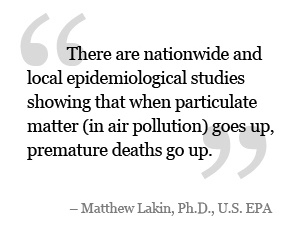Wood Smoke Pollution: Rights and Wrong
Supreme Court Justice Oliver Wendell Holmes once said, “The right to swing my fist ends where the other man’s nose begins.”
Most people interpret this quote to mean that no one has a right to do something that will directly hurt someone else: You can swing your fist, but you can’t make contact with someone’s face. After all, no one wants to get punched in the nose.
Here at Families for Clean Air, we think this concept applies to wood smoke pollution as well. All too often, articles about curtailing wood smoke pollution, especially those about the negative impact of fireplace or wood stove use, are greeted with outraged comments extolling the “right to burn” (ignoring the fact that no one has the “right” to burn). Other comments claim that people concerned about wood smoke should mind their own business.
In response to a recent New York Times article about the harmful effects of wood smoke, Brown University Philosophy Professor Felicia Nimue Ackerman opined, “I think that monitoring your friends and neighbors for environmental purity should be the next social crime.”
We’d like to ask Dr. Ackerman a question: When did protecting one’s health and fighting for clean air become a “social crime”? When your neighbor is doing something that harms you and your family, it becomes your business, too. It’s as simple as that.
Scores of studies document the hazards of wood smoke, while others show that wood smoke pollution can enter neighboring houses, even when the windows and doors are shut. This is not about “environmental purity” (although wood smoke is very polluting), it is about the right to breathe the cleanest air possible.
The bottom line? No one has the “right” to burn when their proximity to other houses or buildings means that others will be unwillingly exposed to the toxins they produce when they burn wood.
In other words: Your right to burn wood ends where your neighbor’s nose begins.




